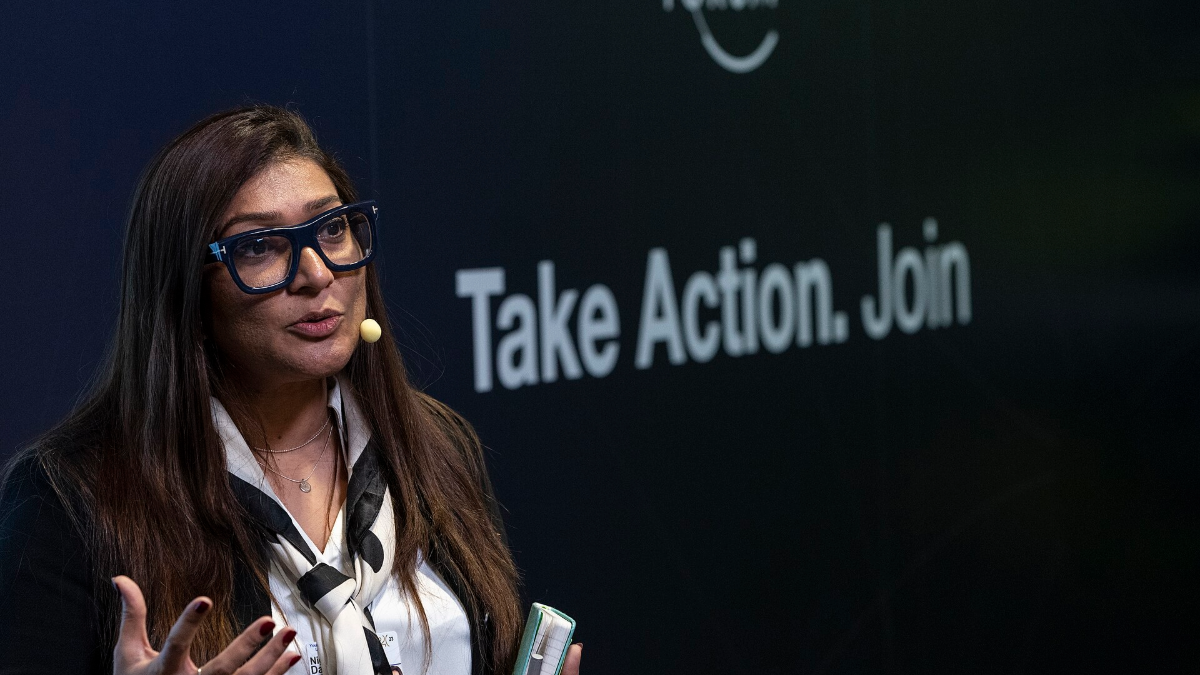A Growing Number of Women Activists Confront Technology and Gender-Based Violence
Sudeshna Mukherjee, Ayça Atabey / Jan 30, 2024
Nighat Dad, Founder and Executive Director, Digital Rights Foundation, Pakistan speaking in the Next-Generation Leadership: Digital Rights and Inclusion session at the World Economic Forum Annual Meeting 2023 in Davos-Klosters, Switzerland, 19 January 2024. World Economic Forum/Faruk Pinjo
Digital media and the internet have introduced people to new ways to learn, game, socialize, and even engage in intimacy. On the one hand, technology and the online world can bolster gender equality, including by empowering female public figures such as journalists, politicians, human rights defenders, and feminists across the globe. On the other hand, the digital revolution creates significant risks, including online abuse against women and girls, worsening already existing deeply rooted gender biases, especially in crises and conflict settings.
The Truth Gap, a 2021 report by Plan International surveying 26,000 girls and young women in 26 countries, found that misinformation and disinformation negatively impacted 87% of respondents, restricting girls' activism. Notably, one in four girls felt less confident about sharing their views online. The negative effects of online threats have wide impacts relating to women and girls’ psychological and mental health, surveillance and privacy. They undermine efforts to incorporate digital security considerations in feminist agendas, rights to data protection and privacy, freedom of assembly or participation in the public sphere, and non-discrimination, among many others.
Select cases of technology-facilitated violence impacting feminists
The nexus of technology, gender, and violence is strong. 85% of women worldwide witnessed online violence against other women, per the Economist Intelligence Unit. We refer to violence directed at someone of marginalized gender identity and enabled by or mediated through digital technologies and devices such as smartphones, the internet, and social media platforms as technology-facilitated gender-based violence (TFGBV). This violence can take many forms, may come from an individual or a group, and is aimed at both the world-famous and the “obscure.” But it is women politicians and activists who bear the brunt of it.
For instance, the treatment of former New Zealand Prime Minister Jacinda Ardern revealed how the COVID-19 pandemic exacerbated TFGBV. In her very first term, Ardern handled a terrorist attack, a volcanic eruption, and the global pandemic with widely hailed stoic integrity and empathy. And yet, she has been the subject of relentless attacks. Kenyan journalist Mwende Maundu, an expert in gender digital safety, highlighted that online harassment often drives women off platforms and likened the phenomenon of journalists choosing self-censorship to an attack on "the fundamental right to freedom of information." The targeted Islamophobic hate and online abuse directed at Amira Elghawaby for her appointment by the Canadian government to combat Islamophobia highlights the extent of this abuse. A 2019 UNESCO research, The Chilling, highlighted that 73% of women journalists have experienced online violence.
But it is not only high-profile women who are affected. TFGBV amplifies existing inequality and is part of a recurring continuum of abuse in women's lives across online and offline spaces. In 2013, an ex-boyfriend attempted to shame an Egyptian internet activist through the non-consensual sharing of a private video of her dancing. A decade later, advances in generative artificial intelligence (AI) have enabled an explosion of deepfake porn that disproportionately targets women and girls, magnifying the problem of non-consensual intimate image (NCII) abuse.
Examining Online Abuse through an Intersectional Lens: Seyi Akiwowo, Glitch, the UK
Seyi Akiwowo, former councilor of Newham, a borough of London, founded the charity Glitch after being subjected to racist and sexist abuse online. She campaigned to ‘fix the glitch’ in the internet. Akiwowo's journey reveals the need for an intersectional approach to address the compounding impacts of gender, race, and other identity factors in online abuse and focus on the challenges facing Black women. A lack of diversity in tech and inadequate media literacy further enable online toxicity.
Akiwowo argues that self-regulation by platforms has failed. Her advocacy recognizes the need for stakeholder research to deepen user understanding of online violence, including identity theft, cyberbullying, and surveillance to design feminist technology, and adopts a public health approach. Glitch was instrumental in getting women and girls named in the recently passed Online Safety Act (UK), and Akiwowo has been appointed to the Advisory Board of the Online Safety Act Network, which brings together parliamentarians, the regulator Ofcom, and civil society groups for effective implementation of the Act. The charity’s pioneering research, the Digital Misogynoir Report, highlights the ways Black women are harmed online, and puts forward recommendations for governments, tech companies and digital citizens to end misogynoir online and off. Akiwowo, in her recent book How to Stay Safe Online, promotes building a digital self-care toolkit and the concept of digital allyship, ultimately hoping for a safer, more joyous internet.
Digital Feminism Under Threat: Nighat Dad, Digital Rights Foundation, Pakistan
Nighat Dad, Pakistani human rights lawyer, highlights the paradox facing women’s rights defenders online. The founder of the Digital Rights Foundation and a member of the Meta Oversight Board remarked, “There's a whole machinery working actively to malign feminist voices.” While opening new avenues, digital spaces expose activists like Dad, a prominent voice in women’s online safety in the global majority, to heightened threats from individual harassers, state actors, and fundamentalists intent on silencing dissent. In Pakistan, despite constitutional guarantees of equality, online safety for women remains elusive. Blasphemy laws and entrenched patriarchal norms result in incidents like the tragic honor killing of social media influencer Qandeel Baloch despite pleas for protection. The lack of political will to ensure women’s safety results in vicious attacks on those in non-traditional roles, like politics and the public sphere. COVID-19 further pushed feminist organizing online, fostering “a new kind of feminist praxis.”
Dad emphasizes the need for concerted actions and a holistic approach through state, civil society, and tech sector cooperation. Specifically, she calls for policies to curb “hate speech and disinformation campaigns” in making online spaces safer for women. With a powerful motivation, where “Internet access should be a basic human right”, Dad models a determined struggle for gender digital justice amidst instability and hostility. But provoking change requires dismantling the machinery of repression targeting women online. Heeding voices like Dad’s, who sits on the United Nations Secretary General's high-level advisory board on Artificial Intelligence (AI), is vital for envisioning a feminist digital future.
Virtual Reality, Bodily Autonomy, and Misogynistic Harassment: Nina Jane Patel, Kabuni, the UK
A movement psychotherapist and mother of teenagers, Nina Jane Patel co-founded the virtual reality (VR) company Kabuni to harness technology for good through immersive education. Since 2022, after facing sexual harassment in the metaverse, Patel spotlights issues in women’s autonomy, normalized misogyny spilling into immersive spaces, and the safety of emerging technologies. As the violent harassment endured, Patel faced questions over her right to even complain about the virtual experience and found that industry rhetoric on expanding inclusion often contradicts the lived reality of gendered online abuse that anonymity facilitates. Patel shares her story to advocate for a safer metaverse, prioritizing ethics and safety in design, formulating regulations preventing harm, and fostering innovation for social good. Patel and her fellow researchers highlighted that despite the predicted benefits of metaverse technologies, their negative outcomes remain relatively unexplored, lacking critical expert examination.
Unfortunately, her experience is not isolated; the British police, for instance, are currently investigating the virtual gang rape of a minor girl. As technology blurs the boundaries between the real and virtual worlds, Patel, a frequent collaborator with the Centre for Abuse and Trauma at Middlesex University, shares that people can have profound psychological experiences in the metaverse and form meaningful attachments comparable to experiences in the physical world.
Reviewing Technology Regulation Through a Feminist Lens: Anastasia Kargianni, Datawo, Greece
Anastasia Kargianni, a digital rights advocate, PhD Researcher on gender discrimination in AI, and co-founder of the legal advocacy nonprofit Datawo, recently critiqued Greece's proposed NCII abuse law for incorrectly framing “revenge porn” as the primary issue, overlooking more common motivations like financial gain or personal gratification in perpetuating harm, as in the recent case of a Greek TV show host. Citing another instance of a young girl’s death by suicide after leaked images and blackmail, Kargianni highlighted legislative gaps enabling abuse and barriers to justice. Separately, she had warned that the previously proposed EU regulations of ‘chat control’ enabling mass surveillance of private communication would disproportionately harm marginalized groups like children. In November 2023, the Civil Liberties Committee voted down the controversial proposal.
While feeling activism itself is threatened by such unfettered monitoring, Kargianni notes that social platforms provide space for civic participation when used responsibly. Beyond critiquing existing systems, Kargianni advocates for more comprehensive Greek legislation to address online voyeurism, image-based sexual abuse via sextortion, cyber stalking and harassment, swift content removal, cross-border cooperation, and trauma-informed victim support. Datawo’s projects raise awareness about reducing inequality and preventing digital gender-based violence through research, training experts, and educating schools on data protection and women's rights.
The regulatory landscape
As evident from the above narratives, there is a lot to be done to address gender inequality in today’s digital world. Currently, no single international law explicitly addresses violence against women in the digital environment. When implemented in combination, legal instruments and other transnational frameworks, such as the Council of Europe’s Istanbul Convention, supplemented by the GREVIO General Recommendation No. 1, the Lanzarote Convention, and the Budapest Convention, can be effective tools in combating TFGBV. However, the rapid advancement of AI has augmented the scope of harm and increased the risks of gender-based violence, further necessitating better policy-making to arrive at a remedy. Emerging cross-border collaborations and agreements also help States address the challenges in today’s digital world.
Complementing such efforts and crucial for translating international laws into practice are concrete local and national approaches in legislation and policymaking:
- Australia’s eSafety Commissioner, the world’s first government online safety regulator, strives to make digital spaces safer for women.
- In Europe, there is the Digital Services Act, while in the UK, there is the recently passed Online Safety Act, both of which strengthen the business case for tech firms to incorporate safety into digital products and services. In a new development, England and Wales have introduced reformed intimate image abuse laws, an amendment to the aforementioned Online Safety Act, making it possible to charge and convict someone for sharing or threatening to share NCII.
- The US frames TFGBV as requiring coordinated regulatory and programmatic actions across stakeholders to safeguard women's rights and secure digital access and participation. The State Department-led Global Partnership for Action on Gender-Based Online Harassment and Abuse forwards this vision through a coalition of 12 countries, including Australia, Canada, Chile, Denmark, Iceland, Kenya, Mexico, New Zealand, Republic of Korea, Sweden, the United Kingdom and the US. In response to the Taylor Swift deepfake controversy, US Senators have proposed introducing the Disrupt Explicit Forged Images and Non-Consensual Edits (DEFIANCE) Act to allow victims to sue over digitally faked images.
- Canada, as the 2022 chair of the Freedom Online Coalition, committed to working with partners on research and advocacy to counter online gender-based violence.
- In the Global Majority, Zimbabwe has taken a stand on tackling online violence. Under the joint EU-UN Spotlight Initiative, the country held its first industry roundtable on online abuse of women and children.
- India's proposed Digital India Bill and recent G20 Presidency offered opportunities to strengthen systems through digital public infrastructure, skilling, and security. With 48.7% internet penetration, initiatives to combat TFGBV include the IT Ministry's Stay Safe Online campaign, and a think tank-led policy framework developed using a public-private partnership approach.
- In Sri Lanka, in response to the nation's proposed online safety bill to tackle disinformation ahead of the national elections, policy think tank Factum has drafted a voluntary "Code of Practice for Online Safety" pushing for the inclusion of TFGBV that tech companies must tackle through proper content moderation and regulation.
The way forward
While policy and legal efforts are vital, accountability from the tech sector itself remains paramount and yet woefully inadequate. Tech companies bear ethical duties for the safety, equity, and rights implications of the platforms and systems enabling TFGBV. With greater investment in technology to detect and mitigate harms and stricter application of human rights due diligence in the design and deployment of products and services, the online world can be made safer and empowering for women. Yet the recent tech layoffs shrinking the “Trust and Safety” workforce signal a deprioritization of online safety.
We seek to highlight the key challenges of underreporting, poor media literacy, inequitable tech access for women and girls, widespread patriarchal social norms, weak legislation, and the silencing of activists, among others. Even as the regulatory and policy landscape evolves, TFGBV transcends borders, indicating the need for participatory and multi-stakeholder approaches to close the gender digital divide.
Importantly, listening to the women themselves should be at the heart of efforts to address these challenges. Beyond strengthening legislation and support networks, how can we elevate women’s safety and empowerment in the broader discourse? How can we leverage the Sustainable Development Goals to advance gender equality in the digital public sphere? These are important questions to start thinking about to develop practical steps to address the challenges in today's digital world. We might not have all the answers for now, but we trust in the direction - a gender-responsive approach to designing and regulating the digital world.
Acknowledgments: The authors gratefully acknowledge the contributions of Seyi Akiwowo, Nighat Dad, Nina Jane Patel, and Anastasia Kargianni for generously sharing their insights, without which this article would not be possible.
Authors

